Enhancing Performance: Managing Cross-Cultural Teams in MNCs
VerifiedAdded on 2023/06/11
|12
|3342
|271
Essay
AI Summary
This essay discusses the opportunities and challenges presented by culturally diverse teams within multinational corporations (MNCs). It defines key terms like corporate culture, MNCs, and cross-cultural teams, highlighting their interlinkages and implications. The essay explores how MNCs balance global standardization with local responsiveness, using Vodafone as a case study to illustrate cultural implications and strategies for diverse team management. It examines various management orientations (EPRG) and addresses challenges such as communication barriers and workplace etiquette differences, ultimately emphasizing the potential for enhanced organizational performance through effective cross-cultural team management. Desklib offers a wealth of resources, including past papers and solved assignments, to further explore this topic.
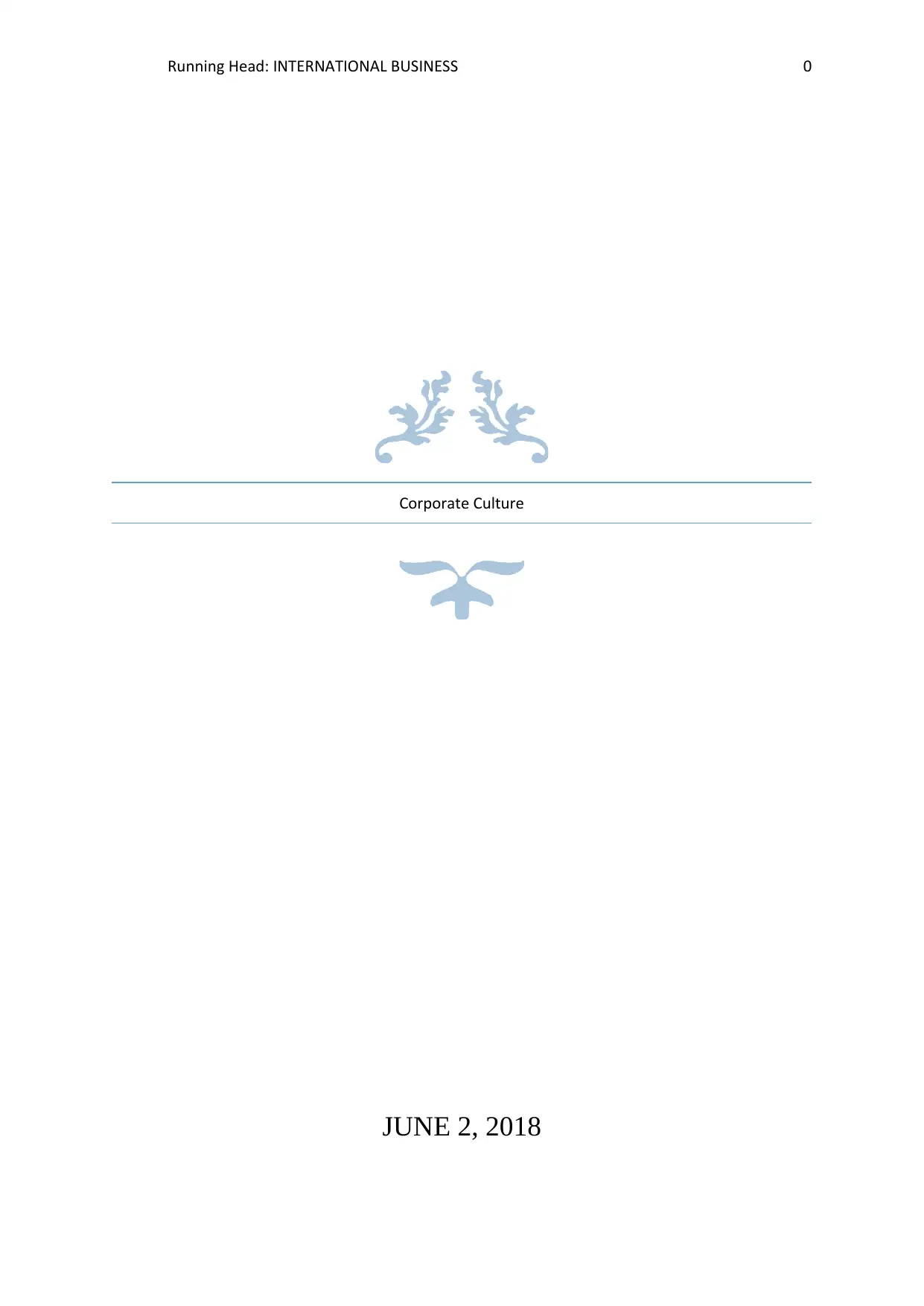
Running Head: INTERNATIONAL BUSINESS 0
Corporate Culture
JUNE 2, 2018
Corporate Culture
JUNE 2, 2018
Paraphrase This Document
Need a fresh take? Get an instant paraphrase of this document with our AI Paraphraser
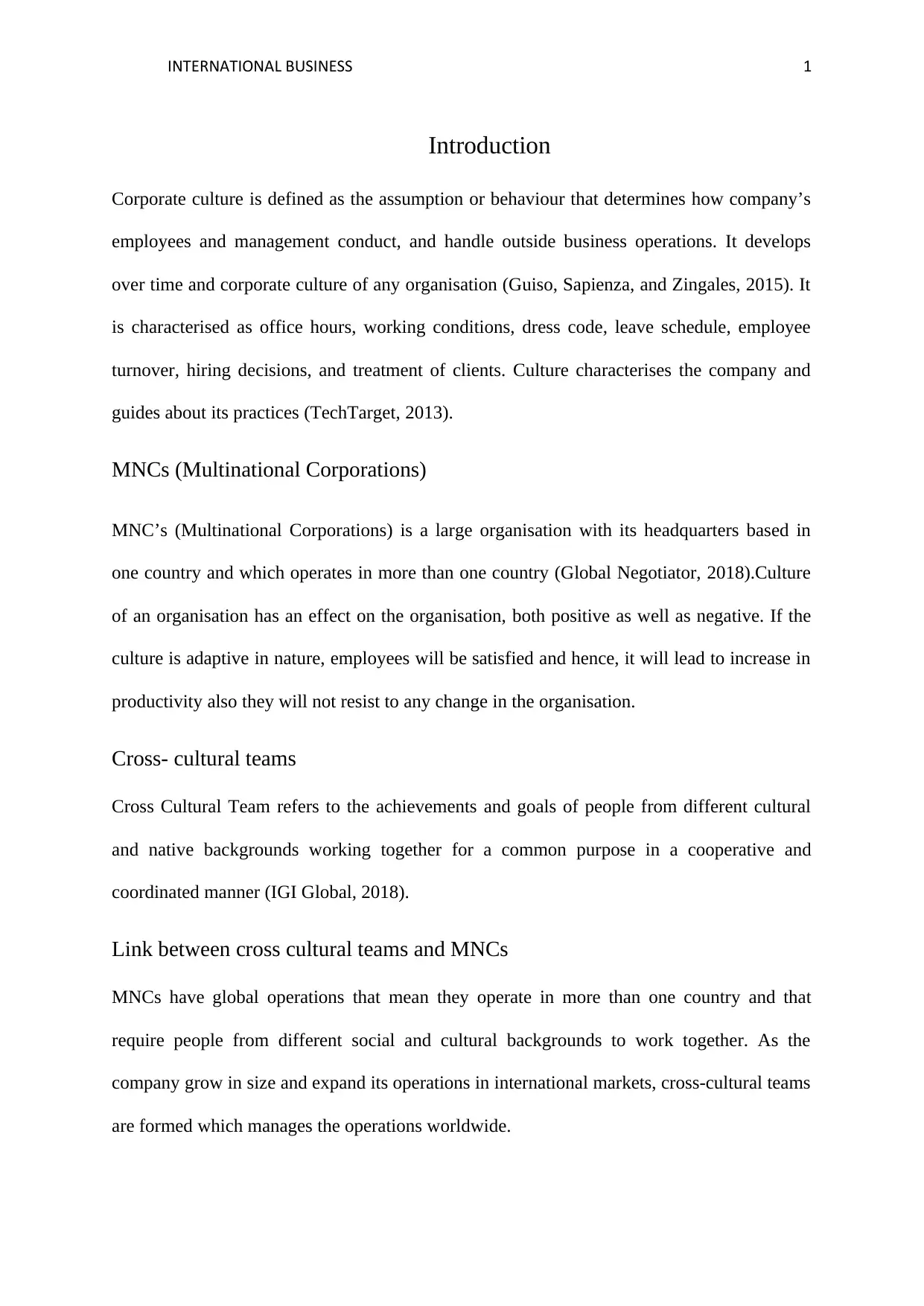
INTERNATIONAL BUSINESS 1
Introduction
Corporate culture is defined as the assumption or behaviour that determines how company’s
employees and management conduct, and handle outside business operations. It develops
over time and corporate culture of any organisation (Guiso, Sapienza, and Zingales, 2015). It
is characterised as office hours, working conditions, dress code, leave schedule, employee
turnover, hiring decisions, and treatment of clients. Culture characterises the company and
guides about its practices (TechTarget, 2013).
MNCs (Multinational Corporations)
MNC’s (Multinational Corporations) is a large organisation with its headquarters based in
one country and which operates in more than one country (Global Negotiator, 2018).Culture
of an organisation has an effect on the organisation, both positive as well as negative. If the
culture is adaptive in nature, employees will be satisfied and hence, it will lead to increase in
productivity also they will not resist to any change in the organisation.
Cross- cultural teams
Cross Cultural Team refers to the achievements and goals of people from different cultural
and native backgrounds working together for a common purpose in a cooperative and
coordinated manner (IGI Global, 2018).
Link between cross cultural teams and MNCs
MNCs have global operations that mean they operate in more than one country and that
require people from different social and cultural backgrounds to work together. As the
company grow in size and expand its operations in international markets, cross-cultural teams
are formed which manages the operations worldwide.
Introduction
Corporate culture is defined as the assumption or behaviour that determines how company’s
employees and management conduct, and handle outside business operations. It develops
over time and corporate culture of any organisation (Guiso, Sapienza, and Zingales, 2015). It
is characterised as office hours, working conditions, dress code, leave schedule, employee
turnover, hiring decisions, and treatment of clients. Culture characterises the company and
guides about its practices (TechTarget, 2013).
MNCs (Multinational Corporations)
MNC’s (Multinational Corporations) is a large organisation with its headquarters based in
one country and which operates in more than one country (Global Negotiator, 2018).Culture
of an organisation has an effect on the organisation, both positive as well as negative. If the
culture is adaptive in nature, employees will be satisfied and hence, it will lead to increase in
productivity also they will not resist to any change in the organisation.
Cross- cultural teams
Cross Cultural Team refers to the achievements and goals of people from different cultural
and native backgrounds working together for a common purpose in a cooperative and
coordinated manner (IGI Global, 2018).
Link between cross cultural teams and MNCs
MNCs have global operations that mean they operate in more than one country and that
require people from different social and cultural backgrounds to work together. As the
company grow in size and expand its operations in international markets, cross-cultural teams
are formed which manages the operations worldwide.
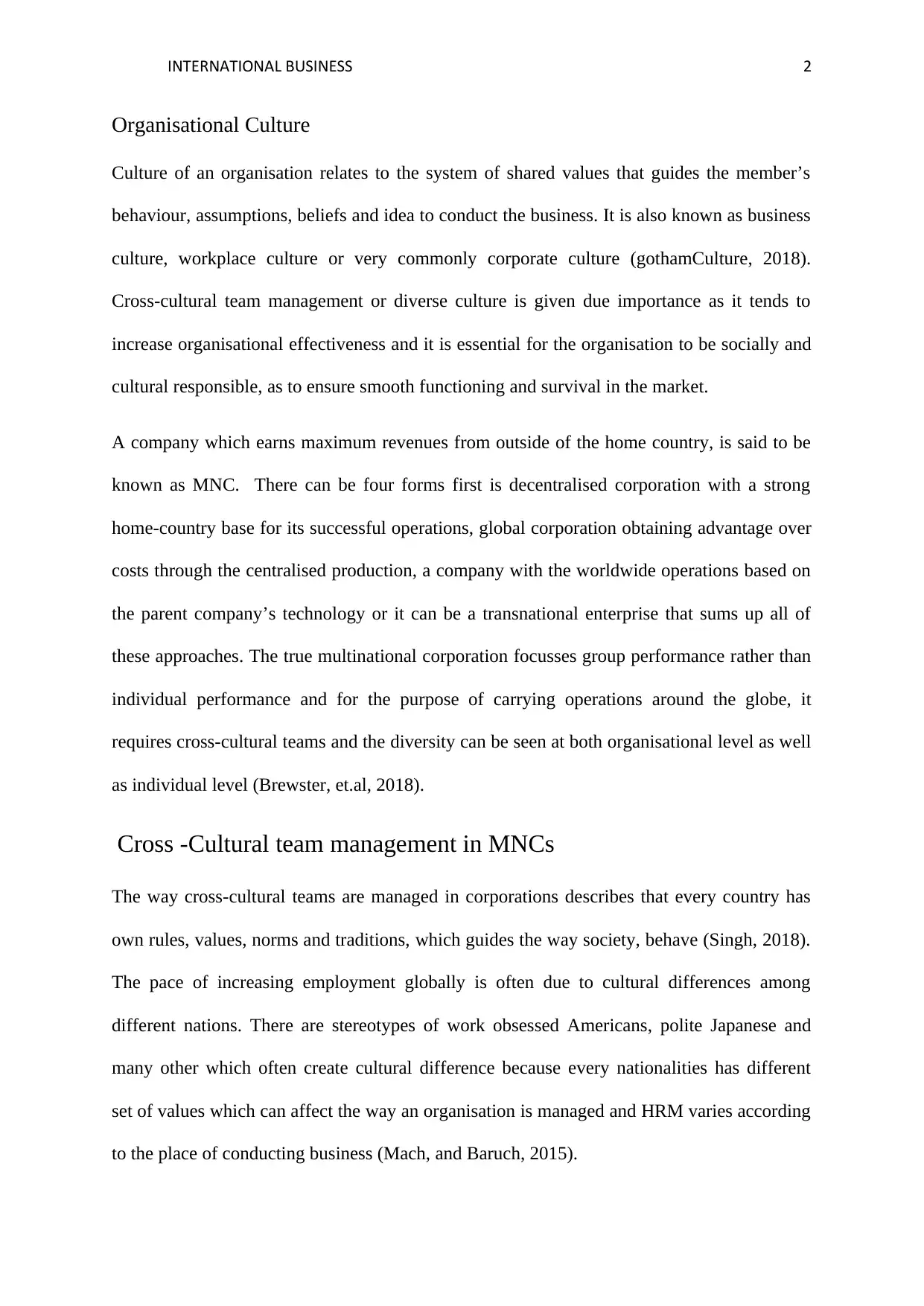
INTERNATIONAL BUSINESS 2
Organisational Culture
Culture of an organisation relates to the system of shared values that guides the member’s
behaviour, assumptions, beliefs and idea to conduct the business. It is also known as business
culture, workplace culture or very commonly corporate culture (gothamCulture, 2018).
Cross-cultural team management or diverse culture is given due importance as it tends to
increase organisational effectiveness and it is essential for the organisation to be socially and
cultural responsible, as to ensure smooth functioning and survival in the market.
A company which earns maximum revenues from outside of the home country, is said to be
known as MNC. There can be four forms first is decentralised corporation with a strong
home-country base for its successful operations, global corporation obtaining advantage over
costs through the centralised production, a company with the worldwide operations based on
the parent company’s technology or it can be a transnational enterprise that sums up all of
these approaches. The true multinational corporation focusses group performance rather than
individual performance and for the purpose of carrying operations around the globe, it
requires cross-cultural teams and the diversity can be seen at both organisational level as well
as individual level (Brewster, et.al, 2018).
Cross -Cultural team management in MNCs
The way cross-cultural teams are managed in corporations describes that every country has
own rules, values, norms and traditions, which guides the way society, behave (Singh, 2018).
The pace of increasing employment globally is often due to cultural differences among
different nations. There are stereotypes of work obsessed Americans, polite Japanese and
many other which often create cultural difference because every nationalities has different
set of values which can affect the way an organisation is managed and HRM varies according
to the place of conducting business (Mach, and Baruch, 2015).
Organisational Culture
Culture of an organisation relates to the system of shared values that guides the member’s
behaviour, assumptions, beliefs and idea to conduct the business. It is also known as business
culture, workplace culture or very commonly corporate culture (gothamCulture, 2018).
Cross-cultural team management or diverse culture is given due importance as it tends to
increase organisational effectiveness and it is essential for the organisation to be socially and
cultural responsible, as to ensure smooth functioning and survival in the market.
A company which earns maximum revenues from outside of the home country, is said to be
known as MNC. There can be four forms first is decentralised corporation with a strong
home-country base for its successful operations, global corporation obtaining advantage over
costs through the centralised production, a company with the worldwide operations based on
the parent company’s technology or it can be a transnational enterprise that sums up all of
these approaches. The true multinational corporation focusses group performance rather than
individual performance and for the purpose of carrying operations around the globe, it
requires cross-cultural teams and the diversity can be seen at both organisational level as well
as individual level (Brewster, et.al, 2018).
Cross -Cultural team management in MNCs
The way cross-cultural teams are managed in corporations describes that every country has
own rules, values, norms and traditions, which guides the way society, behave (Singh, 2018).
The pace of increasing employment globally is often due to cultural differences among
different nations. There are stereotypes of work obsessed Americans, polite Japanese and
many other which often create cultural difference because every nationalities has different
set of values which can affect the way an organisation is managed and HRM varies according
to the place of conducting business (Mach, and Baruch, 2015).
⊘ This is a preview!⊘
Do you want full access?
Subscribe today to unlock all pages.

Trusted by 1+ million students worldwide
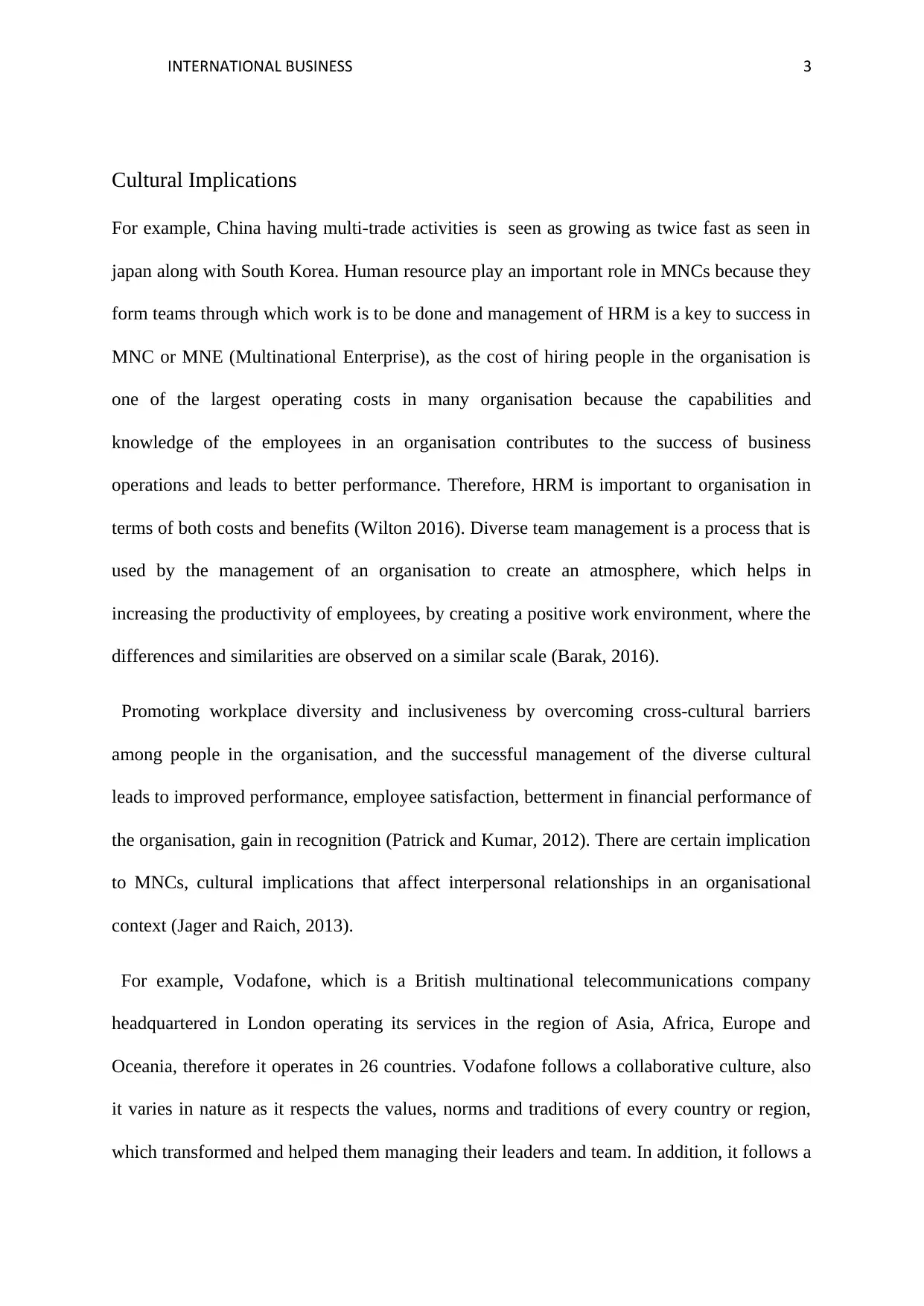
INTERNATIONAL BUSINESS 3
Cultural Implications
For example, China having multi-trade activities is seen as growing as twice fast as seen in
japan along with South Korea. Human resource play an important role in MNCs because they
form teams through which work is to be done and management of HRM is a key to success in
MNC or MNE (Multinational Enterprise), as the cost of hiring people in the organisation is
one of the largest operating costs in many organisation because the capabilities and
knowledge of the employees in an organisation contributes to the success of business
operations and leads to better performance. Therefore, HRM is important to organisation in
terms of both costs and benefits (Wilton 2016). Diverse team management is a process that is
used by the management of an organisation to create an atmosphere, which helps in
increasing the productivity of employees, by creating a positive work environment, where the
differences and similarities are observed on a similar scale (Barak, 2016).
Promoting workplace diversity and inclusiveness by overcoming cross-cultural barriers
among people in the organisation, and the successful management of the diverse cultural
leads to improved performance, employee satisfaction, betterment in financial performance of
the organisation, gain in recognition (Patrick and Kumar, 2012). There are certain implication
to MNCs, cultural implications that affect interpersonal relationships in an organisational
context (Jager and Raich, 2013).
For example, Vodafone, which is a British multinational telecommunications company
headquartered in London operating its services in the region of Asia, Africa, Europe and
Oceania, therefore it operates in 26 countries. Vodafone follows a collaborative culture, also
it varies in nature as it respects the values, norms and traditions of every country or region,
which transformed and helped them managing their leaders and team. In addition, it follows a
Cultural Implications
For example, China having multi-trade activities is seen as growing as twice fast as seen in
japan along with South Korea. Human resource play an important role in MNCs because they
form teams through which work is to be done and management of HRM is a key to success in
MNC or MNE (Multinational Enterprise), as the cost of hiring people in the organisation is
one of the largest operating costs in many organisation because the capabilities and
knowledge of the employees in an organisation contributes to the success of business
operations and leads to better performance. Therefore, HRM is important to organisation in
terms of both costs and benefits (Wilton 2016). Diverse team management is a process that is
used by the management of an organisation to create an atmosphere, which helps in
increasing the productivity of employees, by creating a positive work environment, where the
differences and similarities are observed on a similar scale (Barak, 2016).
Promoting workplace diversity and inclusiveness by overcoming cross-cultural barriers
among people in the organisation, and the successful management of the diverse cultural
leads to improved performance, employee satisfaction, betterment in financial performance of
the organisation, gain in recognition (Patrick and Kumar, 2012). There are certain implication
to MNCs, cultural implications that affect interpersonal relationships in an organisational
context (Jager and Raich, 2013).
For example, Vodafone, which is a British multinational telecommunications company
headquartered in London operating its services in the region of Asia, Africa, Europe and
Oceania, therefore it operates in 26 countries. Vodafone follows a collaborative culture, also
it varies in nature as it respects the values, norms and traditions of every country or region,
which transformed and helped them managing their leaders and team. In addition, it follows a
Paraphrase This Document
Need a fresh take? Get an instant paraphrase of this document with our AI Paraphraser
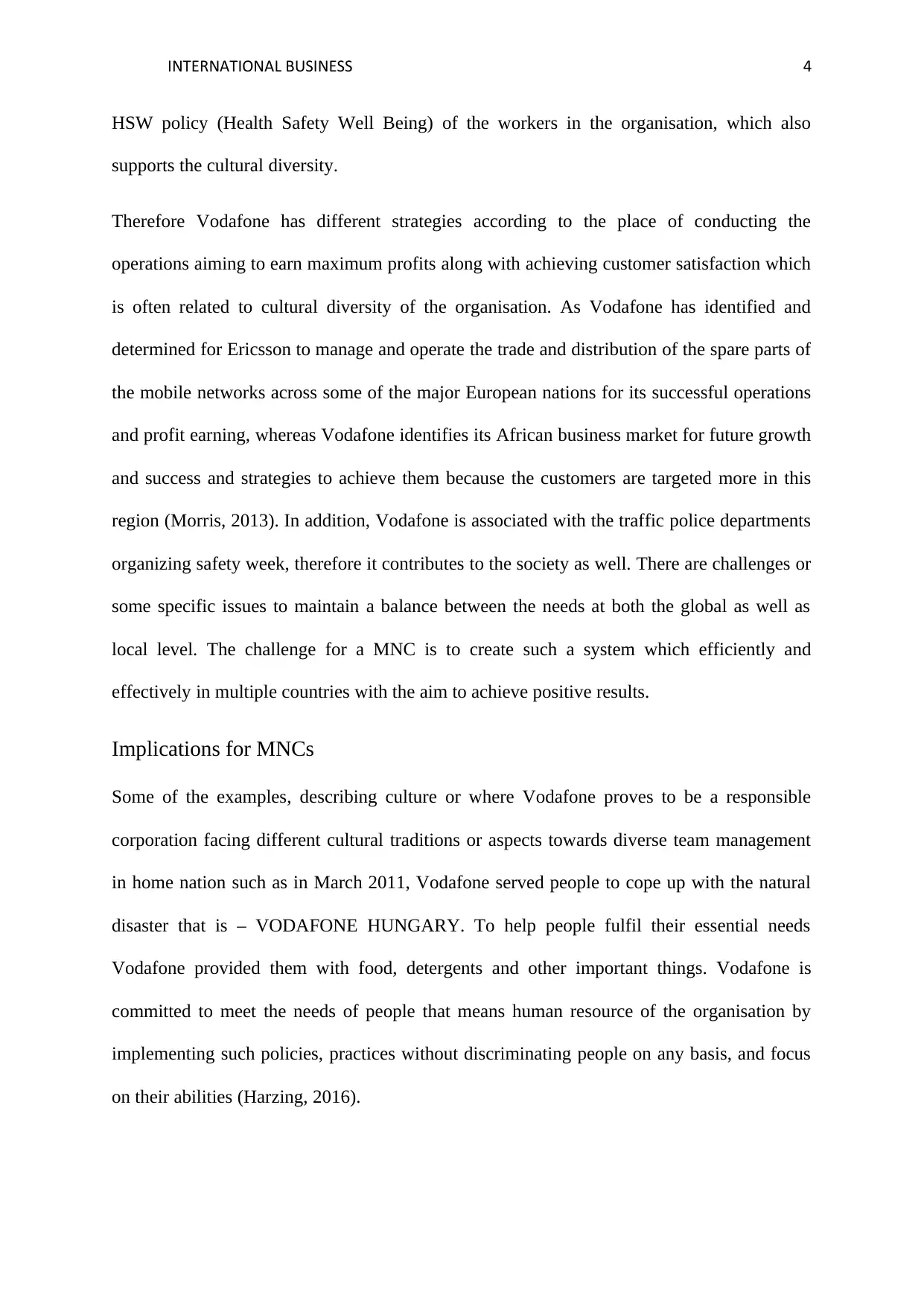
INTERNATIONAL BUSINESS 4
HSW policy (Health Safety Well Being) of the workers in the organisation, which also
supports the cultural diversity.
Therefore Vodafone has different strategies according to the place of conducting the
operations aiming to earn maximum profits along with achieving customer satisfaction which
is often related to cultural diversity of the organisation. As Vodafone has identified and
determined for Ericsson to manage and operate the trade and distribution of the spare parts of
the mobile networks across some of the major European nations for its successful operations
and profit earning, whereas Vodafone identifies its African business market for future growth
and success and strategies to achieve them because the customers are targeted more in this
region (Morris, 2013). In addition, Vodafone is associated with the traffic police departments
organizing safety week, therefore it contributes to the society as well. There are challenges or
some specific issues to maintain a balance between the needs at both the global as well as
local level. The challenge for a MNC is to create such a system which efficiently and
effectively in multiple countries with the aim to achieve positive results.
Implications for MNCs
Some of the examples, describing culture or where Vodafone proves to be a responsible
corporation facing different cultural traditions or aspects towards diverse team management
in home nation such as in March 2011, Vodafone served people to cope up with the natural
disaster that is – VODAFONE HUNGARY. To help people fulfil their essential needs
Vodafone provided them with food, detergents and other important things. Vodafone is
committed to meet the needs of people that means human resource of the organisation by
implementing such policies, practices without discriminating people on any basis, and focus
on their abilities (Harzing, 2016).
HSW policy (Health Safety Well Being) of the workers in the organisation, which also
supports the cultural diversity.
Therefore Vodafone has different strategies according to the place of conducting the
operations aiming to earn maximum profits along with achieving customer satisfaction which
is often related to cultural diversity of the organisation. As Vodafone has identified and
determined for Ericsson to manage and operate the trade and distribution of the spare parts of
the mobile networks across some of the major European nations for its successful operations
and profit earning, whereas Vodafone identifies its African business market for future growth
and success and strategies to achieve them because the customers are targeted more in this
region (Morris, 2013). In addition, Vodafone is associated with the traffic police departments
organizing safety week, therefore it contributes to the society as well. There are challenges or
some specific issues to maintain a balance between the needs at both the global as well as
local level. The challenge for a MNC is to create such a system which efficiently and
effectively in multiple countries with the aim to achieve positive results.
Implications for MNCs
Some of the examples, describing culture or where Vodafone proves to be a responsible
corporation facing different cultural traditions or aspects towards diverse team management
in home nation such as in March 2011, Vodafone served people to cope up with the natural
disaster that is – VODAFONE HUNGARY. To help people fulfil their essential needs
Vodafone provided them with food, detergents and other important things. Vodafone is
committed to meet the needs of people that means human resource of the organisation by
implementing such policies, practices without discriminating people on any basis, and focus
on their abilities (Harzing, 2016).
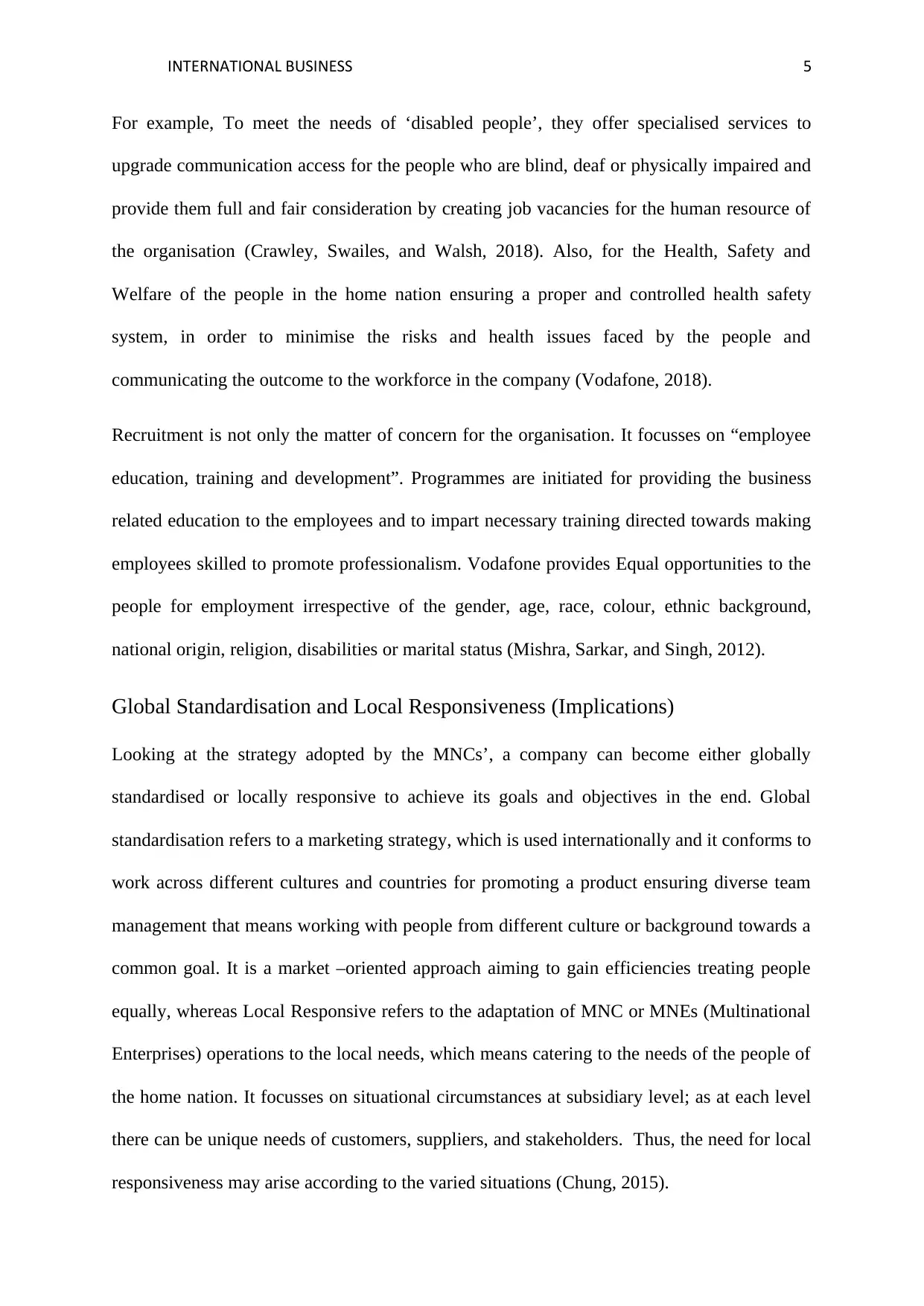
INTERNATIONAL BUSINESS 5
For example, To meet the needs of ‘disabled people’, they offer specialised services to
upgrade communication access for the people who are blind, deaf or physically impaired and
provide them full and fair consideration by creating job vacancies for the human resource of
the organisation (Crawley, Swailes, and Walsh, 2018). Also, for the Health, Safety and
Welfare of the people in the home nation ensuring a proper and controlled health safety
system, in order to minimise the risks and health issues faced by the people and
communicating the outcome to the workforce in the company (Vodafone, 2018).
Recruitment is not only the matter of concern for the organisation. It focusses on “employee
education, training and development”. Programmes are initiated for providing the business
related education to the employees and to impart necessary training directed towards making
employees skilled to promote professionalism. Vodafone provides Equal opportunities to the
people for employment irrespective of the gender, age, race, colour, ethnic background,
national origin, religion, disabilities or marital status (Mishra, Sarkar, and Singh, 2012).
Global Standardisation and Local Responsiveness (Implications)
Looking at the strategy adopted by the MNCs’, a company can become either globally
standardised or locally responsive to achieve its goals and objectives in the end. Global
standardisation refers to a marketing strategy, which is used internationally and it conforms to
work across different cultures and countries for promoting a product ensuring diverse team
management that means working with people from different culture or background towards a
common goal. It is a market –oriented approach aiming to gain efficiencies treating people
equally, whereas Local Responsive refers to the adaptation of MNC or MNEs (Multinational
Enterprises) operations to the local needs, which means catering to the needs of the people of
the home nation. It focusses on situational circumstances at subsidiary level; as at each level
there can be unique needs of customers, suppliers, and stakeholders. Thus, the need for local
responsiveness may arise according to the varied situations (Chung, 2015).
For example, To meet the needs of ‘disabled people’, they offer specialised services to
upgrade communication access for the people who are blind, deaf or physically impaired and
provide them full and fair consideration by creating job vacancies for the human resource of
the organisation (Crawley, Swailes, and Walsh, 2018). Also, for the Health, Safety and
Welfare of the people in the home nation ensuring a proper and controlled health safety
system, in order to minimise the risks and health issues faced by the people and
communicating the outcome to the workforce in the company (Vodafone, 2018).
Recruitment is not only the matter of concern for the organisation. It focusses on “employee
education, training and development”. Programmes are initiated for providing the business
related education to the employees and to impart necessary training directed towards making
employees skilled to promote professionalism. Vodafone provides Equal opportunities to the
people for employment irrespective of the gender, age, race, colour, ethnic background,
national origin, religion, disabilities or marital status (Mishra, Sarkar, and Singh, 2012).
Global Standardisation and Local Responsiveness (Implications)
Looking at the strategy adopted by the MNCs’, a company can become either globally
standardised or locally responsive to achieve its goals and objectives in the end. Global
standardisation refers to a marketing strategy, which is used internationally and it conforms to
work across different cultures and countries for promoting a product ensuring diverse team
management that means working with people from different culture or background towards a
common goal. It is a market –oriented approach aiming to gain efficiencies treating people
equally, whereas Local Responsive refers to the adaptation of MNC or MNEs (Multinational
Enterprises) operations to the local needs, which means catering to the needs of the people of
the home nation. It focusses on situational circumstances at subsidiary level; as at each level
there can be unique needs of customers, suppliers, and stakeholders. Thus, the need for local
responsiveness may arise according to the varied situations (Chung, 2015).
⊘ This is a preview!⊘
Do you want full access?
Subscribe today to unlock all pages.

Trusted by 1+ million students worldwide
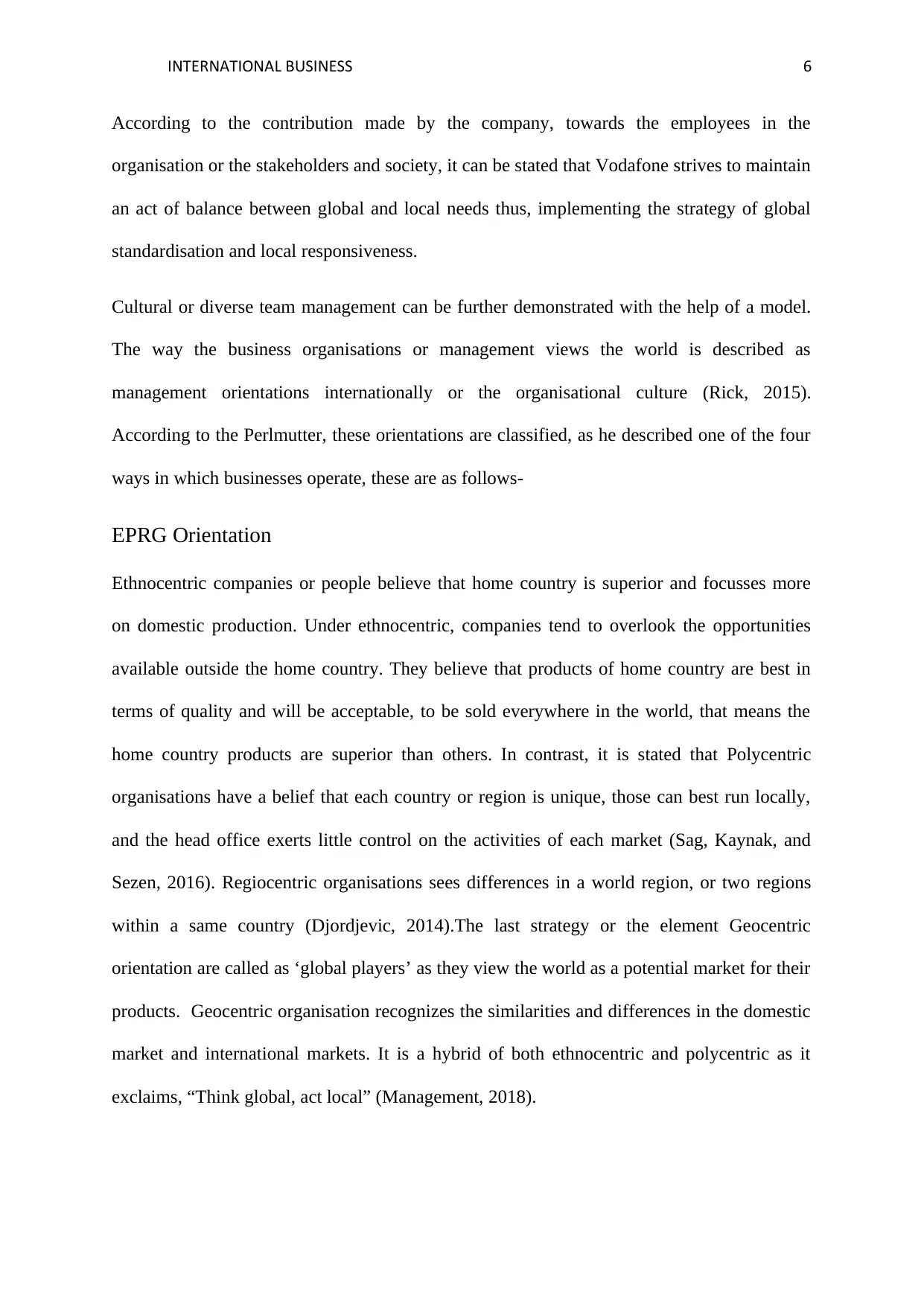
INTERNATIONAL BUSINESS 6
According to the contribution made by the company, towards the employees in the
organisation or the stakeholders and society, it can be stated that Vodafone strives to maintain
an act of balance between global and local needs thus, implementing the strategy of global
standardisation and local responsiveness.
Cultural or diverse team management can be further demonstrated with the help of a model.
The way the business organisations or management views the world is described as
management orientations internationally or the organisational culture (Rick, 2015).
According to the Perlmutter, these orientations are classified, as he described one of the four
ways in which businesses operate, these are as follows-
EPRG Orientation
Ethnocentric companies or people believe that home country is superior and focusses more
on domestic production. Under ethnocentric, companies tend to overlook the opportunities
available outside the home country. They believe that products of home country are best in
terms of quality and will be acceptable, to be sold everywhere in the world, that means the
home country products are superior than others. In contrast, it is stated that Polycentric
organisations have a belief that each country or region is unique, those can best run locally,
and the head office exerts little control on the activities of each market (Sag, Kaynak, and
Sezen, 2016). Regiocentric organisations sees differences in a world region, or two regions
within a same country (Djordjevic, 2014).The last strategy or the element Geocentric
orientation are called as ‘global players’ as they view the world as a potential market for their
products. Geocentric organisation recognizes the similarities and differences in the domestic
market and international markets. It is a hybrid of both ethnocentric and polycentric as it
exclaims, “Think global, act local” (Management, 2018).
According to the contribution made by the company, towards the employees in the
organisation or the stakeholders and society, it can be stated that Vodafone strives to maintain
an act of balance between global and local needs thus, implementing the strategy of global
standardisation and local responsiveness.
Cultural or diverse team management can be further demonstrated with the help of a model.
The way the business organisations or management views the world is described as
management orientations internationally or the organisational culture (Rick, 2015).
According to the Perlmutter, these orientations are classified, as he described one of the four
ways in which businesses operate, these are as follows-
EPRG Orientation
Ethnocentric companies or people believe that home country is superior and focusses more
on domestic production. Under ethnocentric, companies tend to overlook the opportunities
available outside the home country. They believe that products of home country are best in
terms of quality and will be acceptable, to be sold everywhere in the world, that means the
home country products are superior than others. In contrast, it is stated that Polycentric
organisations have a belief that each country or region is unique, those can best run locally,
and the head office exerts little control on the activities of each market (Sag, Kaynak, and
Sezen, 2016). Regiocentric organisations sees differences in a world region, or two regions
within a same country (Djordjevic, 2014).The last strategy or the element Geocentric
orientation are called as ‘global players’ as they view the world as a potential market for their
products. Geocentric organisation recognizes the similarities and differences in the domestic
market and international markets. It is a hybrid of both ethnocentric and polycentric as it
exclaims, “Think global, act local” (Management, 2018).
Paraphrase This Document
Need a fresh take? Get an instant paraphrase of this document with our AI Paraphraser
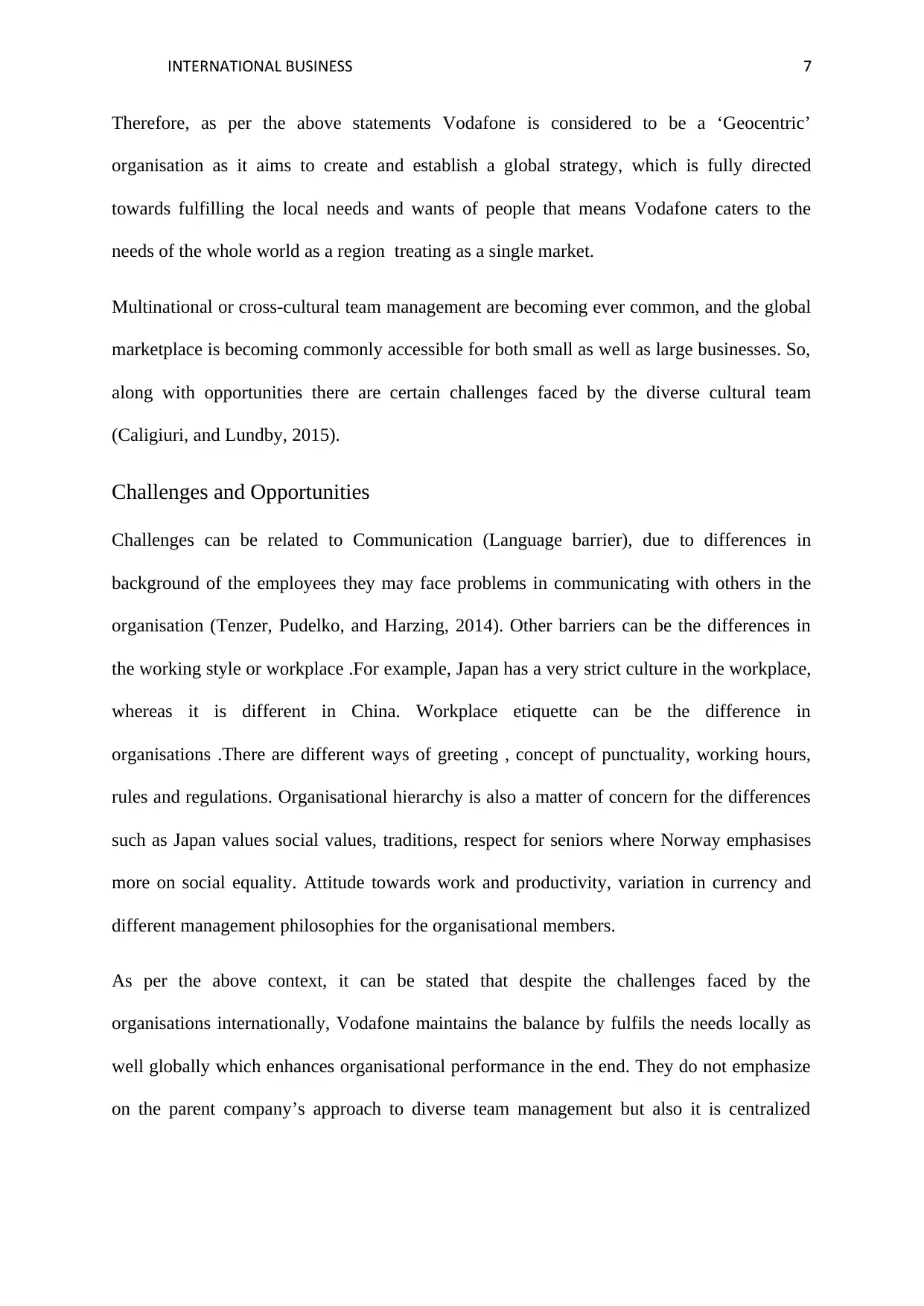
INTERNATIONAL BUSINESS 7
Therefore, as per the above statements Vodafone is considered to be a ‘Geocentric’
organisation as it aims to create and establish a global strategy, which is fully directed
towards fulfilling the local needs and wants of people that means Vodafone caters to the
needs of the whole world as a region treating as a single market.
Multinational or cross-cultural team management are becoming ever common, and the global
marketplace is becoming commonly accessible for both small as well as large businesses. So,
along with opportunities there are certain challenges faced by the diverse cultural team
(Caligiuri, and Lundby, 2015).
Challenges and Opportunities
Challenges can be related to Communication (Language barrier), due to differences in
background of the employees they may face problems in communicating with others in the
organisation (Tenzer, Pudelko, and Harzing, 2014). Other barriers can be the differences in
the working style or workplace .For example, Japan has a very strict culture in the workplace,
whereas it is different in China. Workplace etiquette can be the difference in
organisations .There are different ways of greeting , concept of punctuality, working hours,
rules and regulations. Organisational hierarchy is also a matter of concern for the differences
such as Japan values social values, traditions, respect for seniors where Norway emphasises
more on social equality. Attitude towards work and productivity, variation in currency and
different management philosophies for the organisational members.
As per the above context, it can be stated that despite the challenges faced by the
organisations internationally, Vodafone maintains the balance by fulfils the needs locally as
well globally which enhances organisational performance in the end. They do not emphasize
on the parent company’s approach to diverse team management but also it is centralized
Therefore, as per the above statements Vodafone is considered to be a ‘Geocentric’
organisation as it aims to create and establish a global strategy, which is fully directed
towards fulfilling the local needs and wants of people that means Vodafone caters to the
needs of the whole world as a region treating as a single market.
Multinational or cross-cultural team management are becoming ever common, and the global
marketplace is becoming commonly accessible for both small as well as large businesses. So,
along with opportunities there are certain challenges faced by the diverse cultural team
(Caligiuri, and Lundby, 2015).
Challenges and Opportunities
Challenges can be related to Communication (Language barrier), due to differences in
background of the employees they may face problems in communicating with others in the
organisation (Tenzer, Pudelko, and Harzing, 2014). Other barriers can be the differences in
the working style or workplace .For example, Japan has a very strict culture in the workplace,
whereas it is different in China. Workplace etiquette can be the difference in
organisations .There are different ways of greeting , concept of punctuality, working hours,
rules and regulations. Organisational hierarchy is also a matter of concern for the differences
such as Japan values social values, traditions, respect for seniors where Norway emphasises
more on social equality. Attitude towards work and productivity, variation in currency and
different management philosophies for the organisational members.
As per the above context, it can be stated that despite the challenges faced by the
organisations internationally, Vodafone maintains the balance by fulfils the needs locally as
well globally which enhances organisational performance in the end. They do not emphasize
on the parent company’s approach to diverse team management but also it is centralized
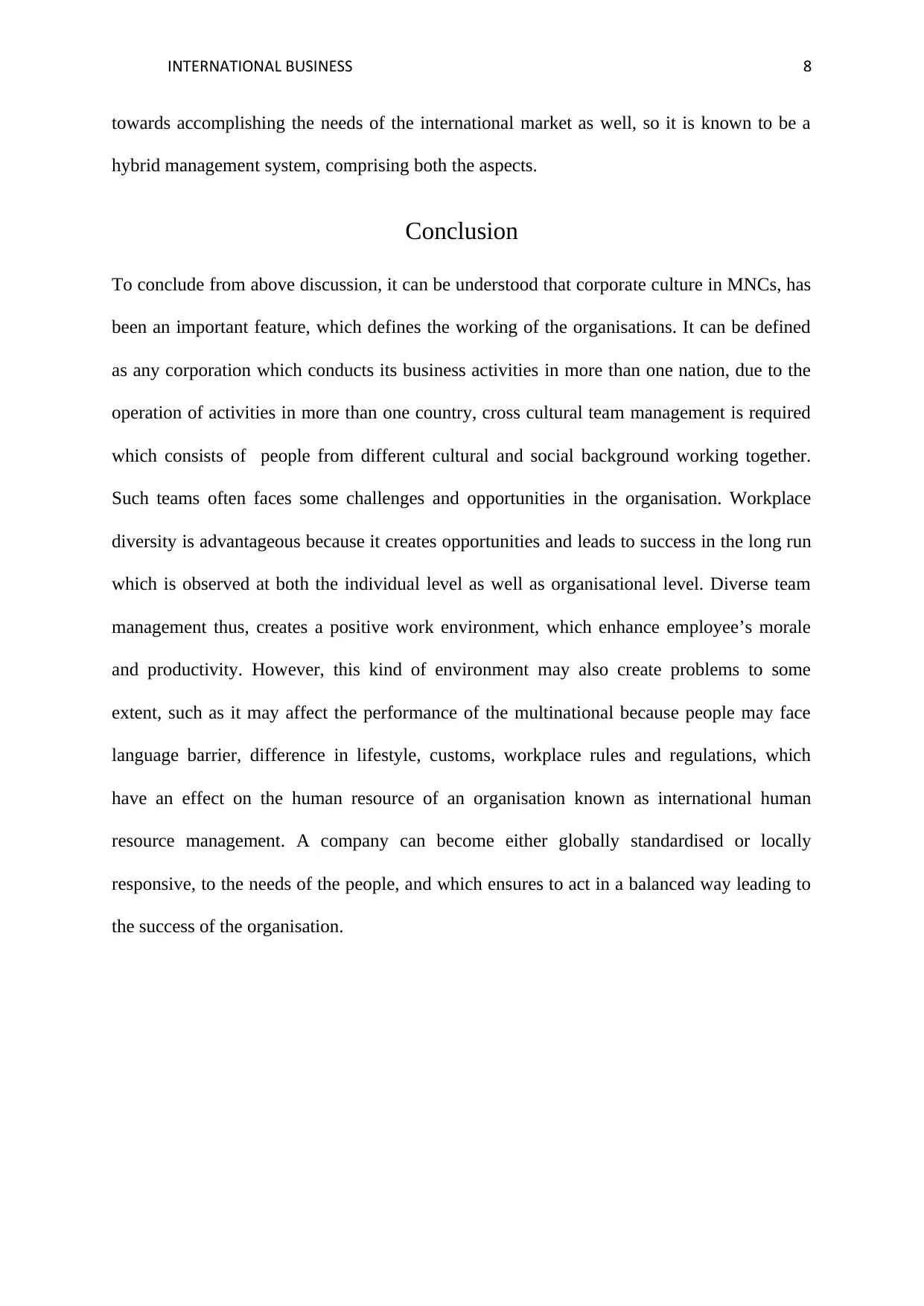
INTERNATIONAL BUSINESS 8
towards accomplishing the needs of the international market as well, so it is known to be a
hybrid management system, comprising both the aspects.
Conclusion
To conclude from above discussion, it can be understood that corporate culture in MNCs, has
been an important feature, which defines the working of the organisations. It can be defined
as any corporation which conducts its business activities in more than one nation, due to the
operation of activities in more than one country, cross cultural team management is required
which consists of people from different cultural and social background working together.
Such teams often faces some challenges and opportunities in the organisation. Workplace
diversity is advantageous because it creates opportunities and leads to success in the long run
which is observed at both the individual level as well as organisational level. Diverse team
management thus, creates a positive work environment, which enhance employee’s morale
and productivity. However, this kind of environment may also create problems to some
extent, such as it may affect the performance of the multinational because people may face
language barrier, difference in lifestyle, customs, workplace rules and regulations, which
have an effect on the human resource of an organisation known as international human
resource management. A company can become either globally standardised or locally
responsive, to the needs of the people, and which ensures to act in a balanced way leading to
the success of the organisation.
towards accomplishing the needs of the international market as well, so it is known to be a
hybrid management system, comprising both the aspects.
Conclusion
To conclude from above discussion, it can be understood that corporate culture in MNCs, has
been an important feature, which defines the working of the organisations. It can be defined
as any corporation which conducts its business activities in more than one nation, due to the
operation of activities in more than one country, cross cultural team management is required
which consists of people from different cultural and social background working together.
Such teams often faces some challenges and opportunities in the organisation. Workplace
diversity is advantageous because it creates opportunities and leads to success in the long run
which is observed at both the individual level as well as organisational level. Diverse team
management thus, creates a positive work environment, which enhance employee’s morale
and productivity. However, this kind of environment may also create problems to some
extent, such as it may affect the performance of the multinational because people may face
language barrier, difference in lifestyle, customs, workplace rules and regulations, which
have an effect on the human resource of an organisation known as international human
resource management. A company can become either globally standardised or locally
responsive, to the needs of the people, and which ensures to act in a balanced way leading to
the success of the organisation.
⊘ This is a preview!⊘
Do you want full access?
Subscribe today to unlock all pages.

Trusted by 1+ million students worldwide
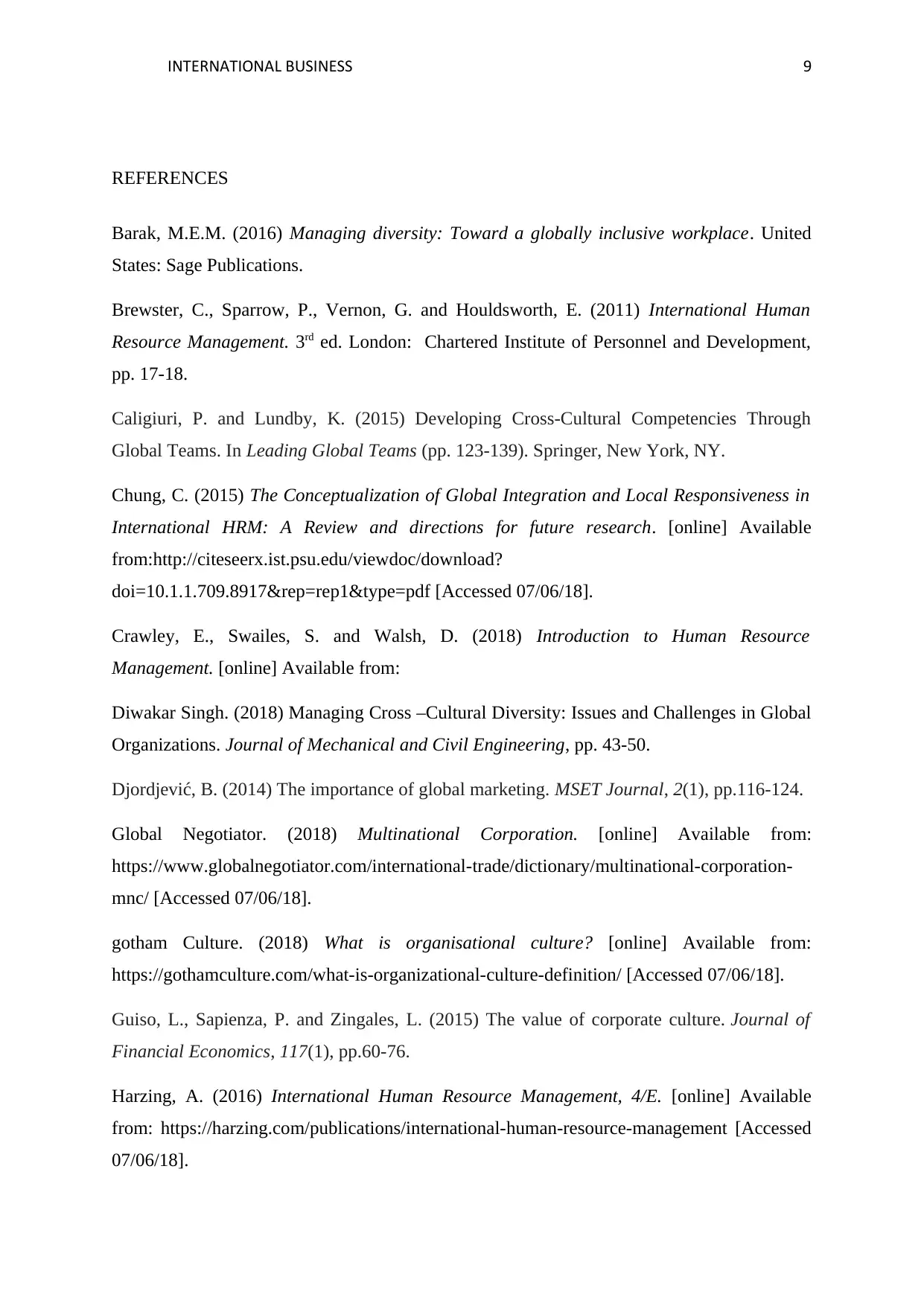
INTERNATIONAL BUSINESS 9
REFERENCES
Barak, M.E.M. (2016) Managing diversity: Toward a globally inclusive workplace. United
States: Sage Publications.
Brewster, C., Sparrow, P., Vernon, G. and Houldsworth, E. (2011) International Human
Resource Management. 3rd ed. London: Chartered Institute of Personnel and Development,
pp. 17-18.
Caligiuri, P. and Lundby, K. (2015) Developing Cross-Cultural Competencies Through
Global Teams. In Leading Global Teams (pp. 123-139). Springer, New York, NY.
Chung, C. (2015) The Conceptualization of Global Integration and Local Responsiveness in
International HRM: A Review and directions for future research. [online] Available
from:http://citeseerx.ist.psu.edu/viewdoc/download?
doi=10.1.1.709.8917&rep=rep1&type=pdf [Accessed 07/06/18].
Crawley, E., Swailes, S. and Walsh, D. (2018) Introduction to Human Resource
Management. [online] Available from:
Diwakar Singh. (2018) Managing Cross –Cultural Diversity: Issues and Challenges in Global
Organizations. Journal of Mechanical and Civil Engineering, pp. 43-50.
Djordjević, B. (2014) The importance of global marketing. MSET Journal, 2(1), pp.116-124.
Global Negotiator. (2018) Multinational Corporation. [online] Available from:
https://www.globalnegotiator.com/international-trade/dictionary/multinational-corporation-
mnc/ [Accessed 07/06/18].
gotham Culture. (2018) What is organisational culture? [online] Available from:
https://gothamculture.com/what-is-organizational-culture-definition/ [Accessed 07/06/18].
Guiso, L., Sapienza, P. and Zingales, L. (2015) The value of corporate culture. Journal of
Financial Economics, 117(1), pp.60-76.
Harzing, A. (2016) International Human Resource Management, 4/E. [online] Available
from: https://harzing.com/publications/international-human-resource-management [Accessed
07/06/18].
REFERENCES
Barak, M.E.M. (2016) Managing diversity: Toward a globally inclusive workplace. United
States: Sage Publications.
Brewster, C., Sparrow, P., Vernon, G. and Houldsworth, E. (2011) International Human
Resource Management. 3rd ed. London: Chartered Institute of Personnel and Development,
pp. 17-18.
Caligiuri, P. and Lundby, K. (2015) Developing Cross-Cultural Competencies Through
Global Teams. In Leading Global Teams (pp. 123-139). Springer, New York, NY.
Chung, C. (2015) The Conceptualization of Global Integration and Local Responsiveness in
International HRM: A Review and directions for future research. [online] Available
from:http://citeseerx.ist.psu.edu/viewdoc/download?
doi=10.1.1.709.8917&rep=rep1&type=pdf [Accessed 07/06/18].
Crawley, E., Swailes, S. and Walsh, D. (2018) Introduction to Human Resource
Management. [online] Available from:
Diwakar Singh. (2018) Managing Cross –Cultural Diversity: Issues and Challenges in Global
Organizations. Journal of Mechanical and Civil Engineering, pp. 43-50.
Djordjević, B. (2014) The importance of global marketing. MSET Journal, 2(1), pp.116-124.
Global Negotiator. (2018) Multinational Corporation. [online] Available from:
https://www.globalnegotiator.com/international-trade/dictionary/multinational-corporation-
mnc/ [Accessed 07/06/18].
gotham Culture. (2018) What is organisational culture? [online] Available from:
https://gothamculture.com/what-is-organizational-culture-definition/ [Accessed 07/06/18].
Guiso, L., Sapienza, P. and Zingales, L. (2015) The value of corporate culture. Journal of
Financial Economics, 117(1), pp.60-76.
Harzing, A. (2016) International Human Resource Management, 4/E. [online] Available
from: https://harzing.com/publications/international-human-resource-management [Accessed
07/06/18].
Paraphrase This Document
Need a fresh take? Get an instant paraphrase of this document with our AI Paraphraser
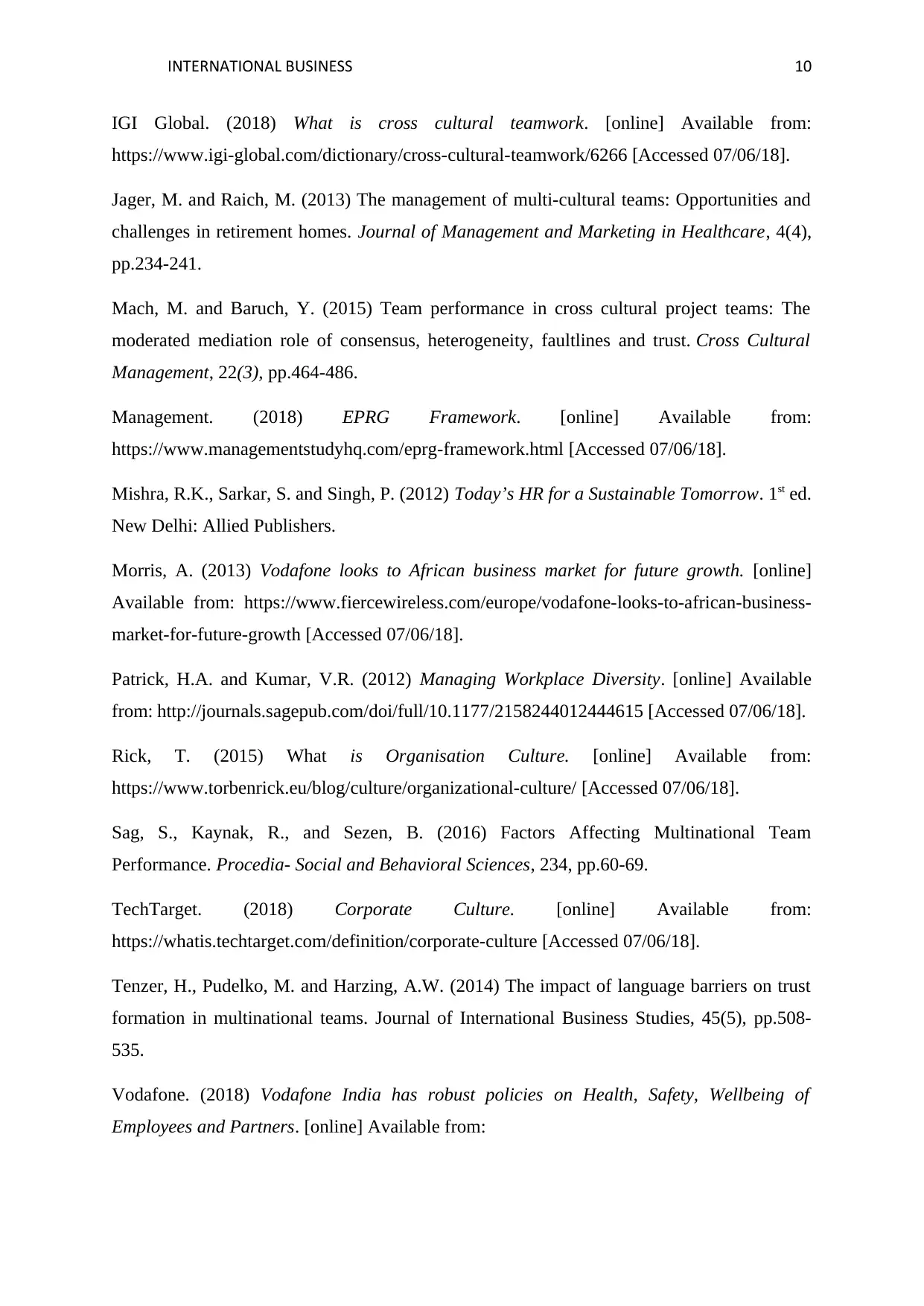
INTERNATIONAL BUSINESS 10
IGI Global. (2018) What is cross cultural teamwork. [online] Available from:
https://www.igi-global.com/dictionary/cross-cultural-teamwork/6266 [Accessed 07/06/18].
Jager, M. and Raich, M. (2013) The management of multi-cultural teams: Opportunities and
challenges in retirement homes. Journal of Management and Marketing in Healthcare, 4(4),
pp.234-241.
Mach, M. and Baruch, Y. (2015) Team performance in cross cultural project teams: The
moderated mediation role of consensus, heterogeneity, faultlines and trust. Cross Cultural
Management, 22(3), pp.464-486.
Management. (2018) EPRG Framework. [online] Available from:
https://www.managementstudyhq.com/eprg-framework.html [Accessed 07/06/18].
Mishra, R.K., Sarkar, S. and Singh, P. (2012) Today’s HR for a Sustainable Tomorrow. 1st ed.
New Delhi: Allied Publishers.
Morris, A. (2013) Vodafone looks to African business market for future growth. [online]
Available from: https://www.fiercewireless.com/europe/vodafone-looks-to-african-business-
market-for-future-growth [Accessed 07/06/18].
Patrick, H.A. and Kumar, V.R. (2012) Managing Workplace Diversity. [online] Available
from: http://journals.sagepub.com/doi/full/10.1177/2158244012444615 [Accessed 07/06/18].
Rick, T. (2015) What is Organisation Culture. [online] Available from:
https://www.torbenrick.eu/blog/culture/organizational-culture/ [Accessed 07/06/18].
Sag, S., Kaynak, R., and Sezen, B. (2016) Factors Affecting Multinational Team
Performance. Procedia- Social and Behavioral Sciences, 234, pp.60-69.
TechTarget. (2018) Corporate Culture. [online] Available from:
https://whatis.techtarget.com/definition/corporate-culture [Accessed 07/06/18].
Tenzer, H., Pudelko, M. and Harzing, A.W. (2014) The impact of language barriers on trust
formation in multinational teams. Journal of International Business Studies, 45(5), pp.508-
535.
Vodafone. (2018) Vodafone India has robust policies on Health, Safety, Wellbeing of
Employees and Partners. [online] Available from:
IGI Global. (2018) What is cross cultural teamwork. [online] Available from:
https://www.igi-global.com/dictionary/cross-cultural-teamwork/6266 [Accessed 07/06/18].
Jager, M. and Raich, M. (2013) The management of multi-cultural teams: Opportunities and
challenges in retirement homes. Journal of Management and Marketing in Healthcare, 4(4),
pp.234-241.
Mach, M. and Baruch, Y. (2015) Team performance in cross cultural project teams: The
moderated mediation role of consensus, heterogeneity, faultlines and trust. Cross Cultural
Management, 22(3), pp.464-486.
Management. (2018) EPRG Framework. [online] Available from:
https://www.managementstudyhq.com/eprg-framework.html [Accessed 07/06/18].
Mishra, R.K., Sarkar, S. and Singh, P. (2012) Today’s HR for a Sustainable Tomorrow. 1st ed.
New Delhi: Allied Publishers.
Morris, A. (2013) Vodafone looks to African business market for future growth. [online]
Available from: https://www.fiercewireless.com/europe/vodafone-looks-to-african-business-
market-for-future-growth [Accessed 07/06/18].
Patrick, H.A. and Kumar, V.R. (2012) Managing Workplace Diversity. [online] Available
from: http://journals.sagepub.com/doi/full/10.1177/2158244012444615 [Accessed 07/06/18].
Rick, T. (2015) What is Organisation Culture. [online] Available from:
https://www.torbenrick.eu/blog/culture/organizational-culture/ [Accessed 07/06/18].
Sag, S., Kaynak, R., and Sezen, B. (2016) Factors Affecting Multinational Team
Performance. Procedia- Social and Behavioral Sciences, 234, pp.60-69.
TechTarget. (2018) Corporate Culture. [online] Available from:
https://whatis.techtarget.com/definition/corporate-culture [Accessed 07/06/18].
Tenzer, H., Pudelko, M. and Harzing, A.W. (2014) The impact of language barriers on trust
formation in multinational teams. Journal of International Business Studies, 45(5), pp.508-
535.
Vodafone. (2018) Vodafone India has robust policies on Health, Safety, Wellbeing of
Employees and Partners. [online] Available from:

INTERNATIONAL BUSINESS 11
http://www.vodafone.in/documents/Pdfs/Pressreleases/Corporate-%20Vodafone%20India
%20-%20HSW%20Note%20-%202015.pdf [Accessed 07/06/18].
Wilton, N. (2016) An introduction to human resource management. United States: Sage
Publications.
http://www.vodafone.in/documents/Pdfs/Pressreleases/Corporate-%20Vodafone%20India
%20-%20HSW%20Note%20-%202015.pdf [Accessed 07/06/18].
Wilton, N. (2016) An introduction to human resource management. United States: Sage
Publications.
⊘ This is a preview!⊘
Do you want full access?
Subscribe today to unlock all pages.

Trusted by 1+ million students worldwide
1 out of 12
Related Documents
Your All-in-One AI-Powered Toolkit for Academic Success.
+13062052269
info@desklib.com
Available 24*7 on WhatsApp / Email
![[object Object]](/_next/static/media/star-bottom.7253800d.svg)
Unlock your academic potential
Copyright © 2020–2025 A2Z Services. All Rights Reserved. Developed and managed by ZUCOL.




